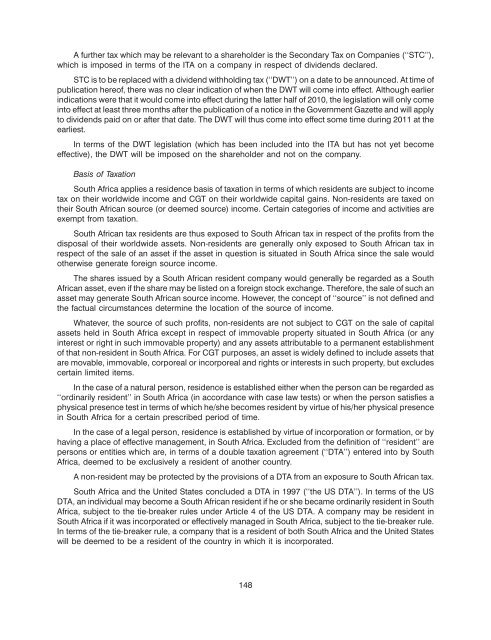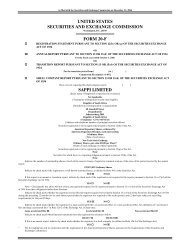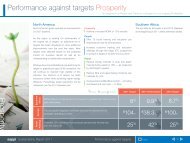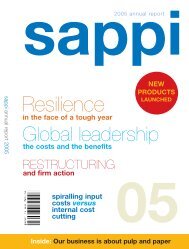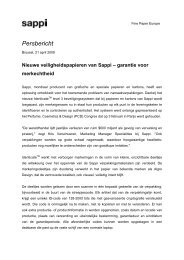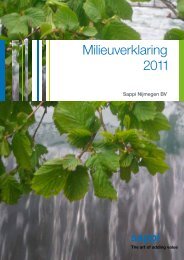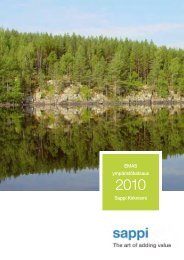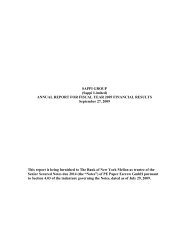You also want an ePaper? Increase the reach of your titles
YUMPU automatically turns print PDFs into web optimized ePapers that Google loves.
A further tax which may be relevant to a shareholder is the Secondary Tax on Companies (‘‘STC’’),<br />
which is imposed in terms of the ITA on a company in respect of dividends declared.<br />
STC is to be replaced with a dividend withholding tax (‘‘DWT’’) on a date to be announced. At time of<br />
publication hereof, there was no clear indication of when the DWT will come into effect. Although earlier<br />
indications were that it would come into effect during the latter half of 2010, the legislation will only come<br />
into effect at least three months after the publication of a notice in the Government Gazette and will apply<br />
to dividends paid on or after that date. The DWT will thus come into effect some time during 2011 at the<br />
earliest.<br />
In terms of the DWT legislation (which has been included into the ITA but has not yet become<br />
effective), the DWT will be imposed on the shareholder and not on the company.<br />
Basis of Taxation<br />
South Africa applies a residence basis of taxation in terms of which residents are subject to income<br />
tax on their worldwide income and CGT on their worldwide capital gains. Non-residents are taxed on<br />
their South African source (or deemed source) income. Certain categories of income and activities are<br />
exempt from taxation.<br />
South African tax residents are thus exposed to South African tax in respect of the profits from the<br />
disposal of their worldwide assets. Non-residents are generally only exposed to South African tax in<br />
respect of the sale of an asset if the asset in question is situated in South Africa since the sale would<br />
otherwise generate foreign source income.<br />
The shares issued by a South African resident company would generally be regarded as a South<br />
African asset, even if the share may be listed on a foreign stock exchange. Therefore, the sale of such an<br />
asset may generate South African source income. However, the concept of ‘‘source’’ is not defined and<br />
the factual circumstances determine the location of the source of income.<br />
Whatever, the source of such profits, non-residents are not subject to CGT on the sale of capital<br />
assets held in South Africa except in respect of immovable property situated in South Africa (or any<br />
interest or right in such immovable property) and any assets attributable to a permanent establishment<br />
of that non-resident in South Africa. For CGT purposes, an asset is widely defined to include assets that<br />
are movable, immovable, corporeal or incorporeal and rights or interests in such property, but excludes<br />
certain limited items.<br />
In the case of a natural person, residence is established either when the person can be regarded as<br />
‘‘ordinarily resident’’ in South Africa (in accordance with case law tests) or when the person satisfies a<br />
physical presence test in terms of which he/she becomes resident by virtue of his/her physical presence<br />
in South Africa for a certain prescribed period of time.<br />
In the case of a legal person, residence is established by virtue of incorporation or formation, or by<br />
having a place of effective management, in South Africa. Excluded from the definition of ‘‘resident’’ are<br />
persons or entities which are, in terms of a double taxation agreement (‘‘DTA’’) entered into by South<br />
Africa, deemed to be exclusively a resident of another country.<br />
A non-resident may be protected by the provisions of a DTA from an exposure to South African tax.<br />
South Africa and the United States concluded a DTA in 1997 (‘‘the US DTA’’). In terms of the US<br />
DTA, an individual may become a South African resident if he or she became ordinarily resident in South<br />
Africa, subject to the tie-breaker rules under Article 4 of the US DTA. A company may be resident in<br />
South Africa if it was incorporated or effectively managed in South Africa, subject to the tie-breaker rule.<br />
In terms of the tie-breaker rule, a company that is a resident of both South Africa and the United States<br />
will be deemed to be a resident of the country in which it is incorporated.<br />
148


